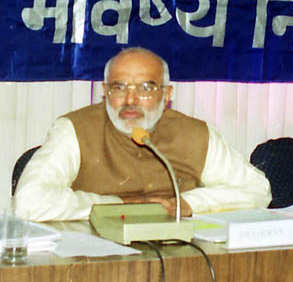Top Qs
Timeline
Chat
Perspective
Sahib Singh Verma
Indian politician (1943-2007) From Wikipedia, the free encyclopedia
Remove ads
Sahib Singh Verma (15 March 1943 – 30 June 2007)[citation needed] was an Indian politician.[1] He served as the 4th Chief Minister of Delhi (1996–1998) and was a member of 13th Lok Sabha, Parliament of India (1999–2004).[2] He served as a Union Labour Minister of India.[3]
This article needs additional citations for verification. (February 2025) |
Remove ads
Life
Sahib Singh Verma was born on 15 March 1943 in Mundka village of Delhi to Chaudhary Mir Singh Lakra, a zamindar, and Bharpai Devi in a Jat family.[4][5] He had 2 brothers Azad Singh Verma and Attar Singh Verma. He was influenced by Arya Samaj from an early age.[citation needed]
Singh had a PhD degree in Library Science, and started work as librarian in Bhagat Singh College, Delhi.[6] He held a master's degree in Arts, (M.A.) and also in Library Science from Aligarh Muslim University.[7]
He was married to Sahib Kaur and had two sons and three daughters. One of his sons, Parvesh Verma is serving as Member of Delhi Legislative Assembly from New Delhi.[8][9]
Remove ads
Political career
Summarize
Perspective
He was active in the Rashtriya Swayamsevak Sangh.[10] He had also served the World Jat Aryan Foundation, as its president.[11]

In 1977 he was elected to the Municipal Corporation of Delhi and took the Oath as a Councillor by the hands of Guru Radha Kishan. Initially he won as a Janata Party candidate and was re-elected on a BJP ticket. He became the Education and Development Minister in the Delhi government in 1993.[12]
In 1996, after Madan Lal Khurana was embroiled in a corruption crisis, Sahib Singh became the Chief Minister of Delhi.[13] Singh served as CM for two and a half years, facing increasing rivalry from Khurana.[14] Following an onion price crisis, he was replaced by Sushma Swaraj.
Subsequently, he won the Lok Sabha elections, 1999 from Outer Delhi with a margin of over two lakh votes.[10] In 2002, he became Minister of Labour in the Vajpayee government, and was known as "bull in a China shop" for standing up against the bureaucrats against lowering the Provident Fund interest rate.[14] He was defeated in the 2004 polls.
He died in a road accident in Rajasthan in 2007 when the car he was travelling in had a head-on collision with a truck.[15]
Remove ads
See also
References
External links
Wikiwand - on
Seamless Wikipedia browsing. On steroids.
Remove ads

